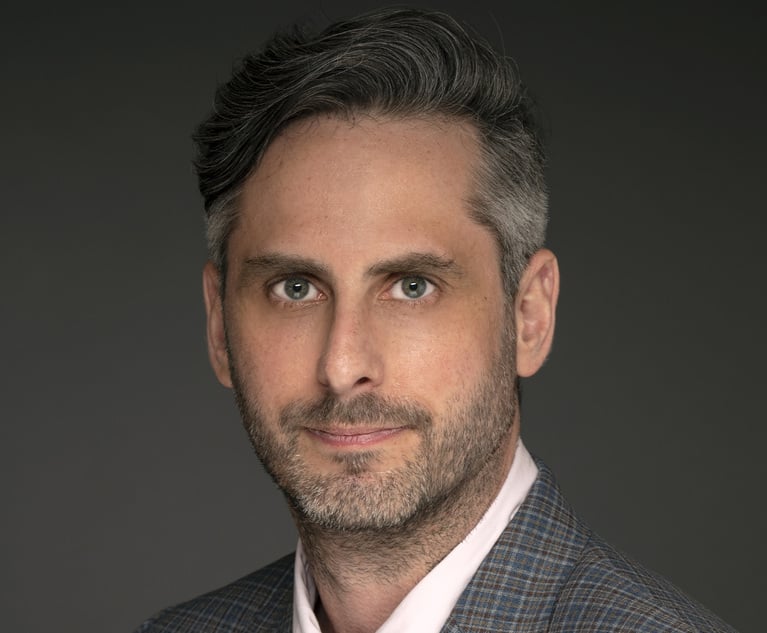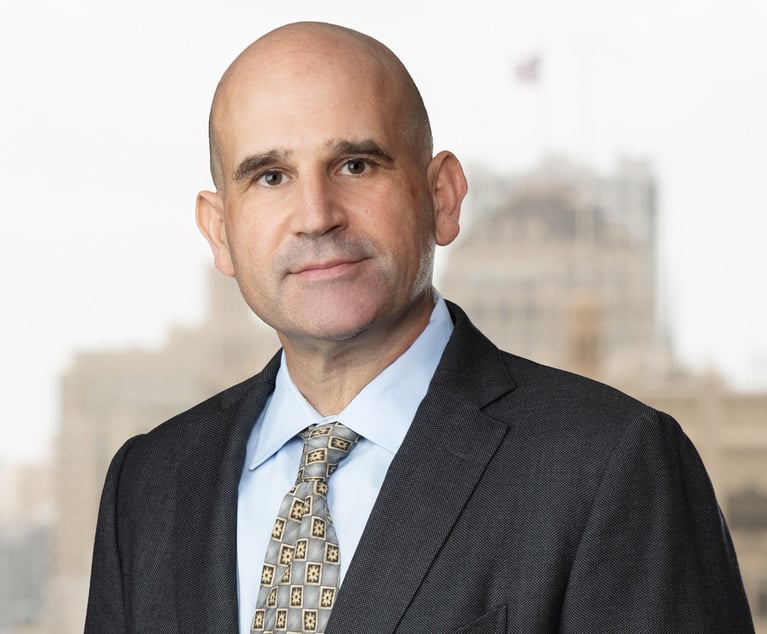 California Supreme Court building at 350 McAllister St., San Francisco. (Photo: Jason Doiy/ALM)
California Supreme Court building at 350 McAllister St., San Francisco. (Photo: Jason Doiy/ALM)Wilson Elser’s Robert Cooper on Winning a Rare Pro-Employer Decision From the Calif. Supreme Court
Cooper won a 5-2 decision from the California Supreme Court in a case brought by a former employee who was seeking to bring a conversion claim for unpaid wages against one of the founders of a trio of failed startup companies.
August 20, 2019 at 03:02 PM
5 minute read
After a string of high-profile wins for employees at the California Supreme Court, last week Wilson Elser Moskowitz Edelman & Dicker’s Robert Cooper got a win for an employer client at the state’s high court in a closely watched case. In a 5-2 decision, the court found that a former employee couldn’t pursue conversion claims against Cooper’s client, Greg Lampert, who was facing claims related to unpaid wages from three of his startup ventures. In a majority opinion written by Justice Leondra Kruger, the court held that allowing conversion claims for lost wages “would reach well beyond those individual corporate officers who withhold wages to punish disfavored employees or who deliberately run down corporate coffers to evade wage judgments.”
The Recorder caught up with Cooper this week to talk about his approach to the case, which he and his firm came onto after the state’s high court granted review. What follows has been edited for length and clarity.
 Robert Cooper, Wilson Elser (Photo: Courtesy Photo)
Robert Cooper, Wilson Elser (Photo: Courtesy Photo)
Would we have seen a conversion claim piled onto basically every wage payment case going forward had the California Supreme Court gone the other way?
Absolutely. And that was one of our arguments in the appellate briefing was if you were to side with the plaintiffs before the California Supreme Court it would be huge ramifications in terms of the number of lawsuits and the length of suits—the shelf-life so to speak—in terms of adding additional remedies that are available under a conversion claim in addition to the statutory remedies that are currently available.
What are those remedies? With all the other statutory remedies that are on the books for plaintiffs bringing wage claims in California, what’s the significance of shutting this particular door?
The dangerous component for the common-law tort claim of conversion is that it exposes employers, and frankly all defendants who are subject to this claim, to the remedy of emotional stress damages which is similar to punitive damages in terms of functioning as a wild card when you convince a jury to award seven-figure damages for what may be rather minor or sometimes technical violations. So, it gets rid of the emotional distress damages. And as the court’s decision indicates, you could be liable under a conversion theory if the court were to recognize this cause of action even if you acted in good faith. So, it’s basically a strict liability standard.
Your client is the founder of some failed startups. How important do you think this decision is to people taking the risk to start a company?
It’s significant in the sense that it allows them to take certain risks that are intrinsic in starting up a company without having to feel personal exposure to a conversion theory. Obviously, if in fact the particular employer engages in bad faith or intentionally withholds wages, they are subject to statutory liability, as they should be for violating the law.
The plaintiff in this case was trying to come up with this exotic theory despite the fact that he had lost on his “alter ego” theory in attempts to hold my client personally liable. That could have a significant impact on not only startup companies, but all employers, whether they are in retail or distribution or manufacturing or any other industry.
You were brought in late in the game. What did you do to prepare this case for the California Supreme Court?
What happened was after the California Supreme Court granted review, I was retained by the client after essentially a beauty contest with other firms based on our expertise in labor litigation and appellate law litigation. Having been retained, I had to do a ton of legal research from scratch, not only on appellate jurisdictional issues but also on labor law issues in terms of the substantive law. Not only did we have to get up to speed by reviewing the extensive record, because the case had been going on for more than a decade. It had generated two prior appeals, so I also had to reach out to certain industry groups to try to solicit amicus briefs. Amicus briefs were filed not only on our behalf but on behalf of the other side. The other side’s amicus folks also participated at the oral argument.
What can counsel in your position—someone representing an employer in the employee-friendly venue of the California Supreme Court—take away from your experience?
That it’s not correct to frame the court as being “pro-employee” or “pro-employer.” This particular court is extremely smart, extremely resourceful, in terms of doing their own independent research and their own independent analysis. This was a well-thought-out decision. Not only is the majority opinion well-reasoned, admittedly the dissenting opinion is reasoned and cogent as well. They don’t make decisions in a pro-consumer, pro-employer fashion per se, as the perception is. I think they look at each case independently and they analyze the law. They decide what the implications are in terms of how they shape the law and they make the practical decision based on the law rather than a particular viewpoint. They shape the law in the way they feel that would best serve the interest of the 40 million California citizens.
This content has been archived. It is available through our partners, LexisNexis® and Bloomberg Law.
To view this content, please continue to their sites.
Not a Lexis Subscriber?
Subscribe Now
Not a Bloomberg Law Subscriber?
Subscribe Now
NOT FOR REPRINT
© 2024 ALM Global, LLC, All Rights Reserved. Request academic re-use from www.copyright.com. All other uses, submit a request to [email protected]. For more information visit Asset & Logo Licensing.
You Might Like
View All
How the Deal Got Done: Sidley Austin and NWSL Angel City Football Club/Iger

How Uncertainty in College Athletics Compensation Could Drive Lawsuits in 2025

How I Made Practice Group Chair: 'Think About Why You Want the Role, Because It Is Not an Easy Job,' Says Aaron Rubin of Morrison Foerster

Outgoing USPTO Director Kathi Vidal: ‘We All Want the Country to Be in a Better Place’
19 minute readTrending Stories
- 1Recent Decisions Regarding the Telephone Consumer Protection Act
- 2The Tech Built by Law Firms in 2024
- 3Distressed M&A: Mass Torts, Bankruptcy and Furthering the Search for Consensus: Another Purdue Decision
- 4For Safer Traffic Stops, Replace Paper Documents With ‘Contactless’ Tech
- 5As Second Trump Administration Approaches, Businesses Brace for Sweeping Changes to Immigration Policy
Who Got The Work
Michael G. Bongiorno, Andrew Scott Dulberg and Elizabeth E. Driscoll from Wilmer Cutler Pickering Hale and Dorr have stepped in to represent Symbotic Inc., an A.I.-enabled technology platform that focuses on increasing supply chain efficiency, and other defendants in a pending shareholder derivative lawsuit. The case, filed Oct. 2 in Massachusetts District Court by the Brown Law Firm on behalf of Stephen Austen, accuses certain officers and directors of misleading investors in regard to Symbotic's potential for margin growth by failing to disclose that the company was not equipped to timely deploy its systems or manage expenses through project delays. The case, assigned to U.S. District Judge Nathaniel M. Gorton, is 1:24-cv-12522, Austen v. Cohen et al.
Who Got The Work
Edmund Polubinski and Marie Killmond of Davis Polk & Wardwell have entered appearances for data platform software development company MongoDB and other defendants in a pending shareholder derivative lawsuit. The action, filed Oct. 7 in New York Southern District Court by the Brown Law Firm, accuses the company's directors and/or officers of falsely expressing confidence in the company’s restructuring of its sales incentive plan and downplaying the severity of decreases in its upfront commitments. The case is 1:24-cv-07594, Roy v. Ittycheria et al.
Who Got The Work
Amy O. Bruchs and Kurt F. Ellison of Michael Best & Friedrich have entered appearances for Epic Systems Corp. in a pending employment discrimination lawsuit. The suit was filed Sept. 7 in Wisconsin Western District Court by Levine Eisberner LLC and Siri & Glimstad on behalf of a project manager who claims that he was wrongfully terminated after applying for a religious exemption to the defendant's COVID-19 vaccine mandate. The case, assigned to U.S. Magistrate Judge Anita Marie Boor, is 3:24-cv-00630, Secker, Nathan v. Epic Systems Corporation.
Who Got The Work
David X. Sullivan, Thomas J. Finn and Gregory A. Hall from McCarter & English have entered appearances for Sunrun Installation Services in a pending civil rights lawsuit. The complaint was filed Sept. 4 in Connecticut District Court by attorney Robert M. Berke on behalf of former employee George Edward Steins, who was arrested and charged with employing an unregistered home improvement salesperson. The complaint alleges that had Sunrun informed the Connecticut Department of Consumer Protection that the plaintiff's employment had ended in 2017 and that he no longer held Sunrun's home improvement contractor license, he would not have been hit with charges, which were dismissed in May 2024. The case, assigned to U.S. District Judge Jeffrey A. Meyer, is 3:24-cv-01423, Steins v. Sunrun, Inc. et al.
Who Got The Work
Greenberg Traurig shareholder Joshua L. Raskin has entered an appearance for boohoo.com UK Ltd. in a pending patent infringement lawsuit. The suit, filed Sept. 3 in Texas Eastern District Court by Rozier Hardt McDonough on behalf of Alto Dynamics, asserts five patents related to an online shopping platform. The case, assigned to U.S. District Judge Rodney Gilstrap, is 2:24-cv-00719, Alto Dynamics, LLC v. boohoo.com UK Limited.
Featured Firms
Law Offices of Gary Martin Hays & Associates, P.C.
(470) 294-1674
Law Offices of Mark E. Salomone
(857) 444-6468
Smith & Hassler
(713) 739-1250






